Summer, 266
576 men
"Now it is time"
I awoke to the sound of a rasping voice whispered into my ear. Waking gradually, I looked around the room, but could see no one. Slowly, I rose.
A veteran centurion entered my quarters: "The enemy are deployed for battle, sir."
I nodded curtly. I found it hard to raise my eyes and my chest had an empty hollow sensation, more to do with the circumstances in which we found ourselves than my own frail constitution.
Seventeen hundred Greeks had arrived outside Apollonia. Seventeen hundred. Mainly hoplites and frankly quite superior to the still rather inexperienced men of Legio IV. They were commanded by a general called Kallinos of Gonni. I knew little of him, but the way he had deployed for the assault revealed him to be a fine general, easily my match. Five battering rams had been constructed and positioned at different points along the north wall. Each were backed by several other units of heavy infantry or missile troops. The general himself remained at the rear of his army, with his escort and two small troops of cavalry. While we could perhaps obstruct one or two rams, there were simply not enough of us to stop all five from breaching our walls.
Somewhere inside me I knew this was Verginius's work. Exactly how he had done it, what toils or tribulations he had gone through to pull it off, I did not know. But somehow his agents had conspired to move the Greeks to muster this large, fine army and march promptly for Apollonia. How else to explain the switch in Greek tactics from sending small armies to besiege us, to concentrating such a large force to crush us?
Why had the First Consul done this? Was it to punish me for staying his hand from eradicating the Gauls he hated so much? Or was it his revenge for my besmirching his honour in the Senate? Was it to provide a demonstration of the folly of Pleminius's motion to send a small army into the heart of the enemy's lands? Or to laugh at my own foolishness in mistakenly voting for the motion? Or was it to provide a high drama for the Senate, so that Verginius could come charging in at the end of his period in office and rescue our beleaguered force with the Consular Army? I do not know. Could you ever know with a man such as Verginius?
Pleminius came to see me as Legio IV took up position. I smiled sadly at him, but he just stared back, his face nonchalant and fixed with a sense of duty. While I wished to be anywhere but here today, this - the chance of glorious battle - was why Pleminius came to Apollonia. I patted him affectionately on his shoulder, as a master might reward an alert and eager guard dog. Then I explained my plan of battle.
Our only advantage over the Greeks lay in our cavalry - the men of my escort and Pleminus's own bodyguard of equites. Sadly, this force would be next to useless in the narrow confines of Apollonia's streets. We could not charge and the massed hoplites would cut us down easily with their spears. Therefore, we had to sally out of the city even as the enemy marched their battering rams towards us. But Kallinos was no fool, he would not halt his assault to fight outside the town. While we might distract some of his men from assailing the town's pallisades, others would still batter their way through. There were four entrances to the town's central forum. I could only afford to post guards on two - the triarii were assigned to guard the north entrance; while the Italian spearmen covered the east, where the enemy battering rams were disporportionately deployed. All the other infantry were to join the cavalry in sallying out of the town gate.
Pleminius nodded eagerly when he heard the plan. Clearly its boldness appealed to him.
"Who do we charge first?" he asked.
"We begin the battle with decapitation. My men will make for Kallinos. You will cover my back in case his other cavalry try to interfere."
A faint trace of a smile passed over Pleminius's pursed lips. Apparently this brutal opening gambit appealed to him even more than the idea of a sally had.
The battlelines are drawn: as the Greeks prepare five assault columns, the Romans prepare to charge out of the north gate, with their spearmen left behind to guard the central forum.
As the five Greek battering rams began shambling forward towards Apollonia's pallisades, I led our men out of the north gate, all moving at the run. We had little time to deploy outside the walls before the many Greek phalanxes pinned us to them. Face to face, even the best Roman infantry had little advantage over hoplites. Our only chance was to flank them. Unfortunately, that called for numerical superiority, something which would be hard - if not impossible - to achieve that day.
The first action of the day - Pleminius (on the near left) and Quintus (centre) together ride for General Kallinos, hoping to render the Greek army leaderless and demoralised.
The ride to reach Kallinos seemed like an eternity. We bypassed the many phalanxes marching towards Apollonia, and the peltasts and Cretan archers deployed behind them in support. Finally, we reached the Greek cavalry, who bravely interposed themselves between us and their general, allowing Kallinos to counter-charge with his superb hetaroi. The fighting was brutal, but the outcome inevitable. Every second we were delayed, however, left our infantry leaderless outside the north gate and left the Greek battering rams elsewhere free to smash down the pallisades without interference.
The first Greek battering ram, on the far east of the northern pallisade, breaks through.
Eventually, General Kallinos was cut down and I urged our horse to return to the north gate to assist our infantry. When we arrived, we found the sallying force had suffered such heavy casualties, it was scarcely functional. In my absence, Greek peltasts and Cretan archers had poured fire into our brave infantry as they struggled to overcome the enemy phalanxes near the gate. Pleminius and I avenged the fallen without mercy, but it was too late. Four parts of the pallisade had been breached and at least eight enemy phalanxes were inside, racing to the central forum.
The Roman cavalry return to allow the Romans to triumph near the north gate. But it has become irrelevant: the walls have been breached in force to the east.
It was now up the spearmen to hold; to hold against quite insurmountable odds. They fought magnificently. I ordered Pleminius to take his escort and the cohort of Italian swordsmen and hunt down any routing Greeks. I hurried the remnants of our sallying force back to the forum. A phalanx of pikemen attempted to intercept us but it fell out of formation as it tried to catch my escort while my infantry harried it from the rear. When it finally turned to face our infantry, it was so disordered, the Greeks had thrown down their sarissas. I seized the moment and charged it in the rear, breaking it within seconds. If only the hoplites with their shorter spears could be so easily disposed of, I thought ruefully.
Our sallying force was now safely back within the pallisade. But the battle had shifted to the central forum and we had to get there quickly. The northern approach was blocked by at least four Greek phalanxes, so I directed only our funditores to take that path. They could fire into the rear of the massed Greeks and perhaps even induce some of them to break off and pursue the skirmishers.
"What do we do when our lead runs out, sir?" the small funditore captain asked me.
I could only shake my head sadly. The captain saluted and turned to lead his men, already at half strength.
Three phalanxes were trying to force the eastern approach to the forum, blocked by our Italian spearmen. So I directed our sallying force to take that path and try to hit the Greeks in the back.
But it was too late. Unobserved by us, one Greek phalanx had taken the western approach to the forum. This allowed it to bypass the spearmen guarding the north and eastern entrances. It occupied the town centre unopposed, before charging the Italian spearmen guarding the eastern approach in the rear. Our Italian allies died bravely, the last spearmen seeming to fight off hundreds of attackers for minutes before he too fell.
When I arrived at the east of the forum, we were faced with four phalanxes of hoplites, while another four pressed against the triarii guarding the north entrance. It was hopeless. Then I saw, racing up the west entrance, Pleminius and his horse. He had chased the Greek routers off the field and was returning to assist in contesting the forum. Taking heart from Pleminius's sudden appearance, I charged my escort into the Greek hoplites guarding the eastern approach to the forum, while Pleminius charged them from the rear.
Quintus attempts to force a way through the east entrance to the forum, while Pleminius charges the rear of the hoplites in support. The many Greek banners in the distance are the hoplites who have forced their way through the northern entrance and have pinned the brave triarii to the wall.
It was not enough. To be honest, not if every Roman horseman and every Roman general in the entire Republic had thrown themselves at the hoplites would it have been enough to break them. They were too many, too brave and too solidly packed. Only a large force of Roman infantry could have moved them from the forum and I had less than fifty such men left from the sallying force. Slowly, inexorably, Legio IV fell. Soon we were down to less than twenty infantry men in the sallying force. The same number of brave triarii were fighting at even more hopeless odds in the north approach.
Through the corner of my eye, I saw a small group of lightly armed, quick moving men dash across the forum towards us. They were the funditores I had sent to the north approach. They had run out of ammunition. As the push of the Greek hoplites had swept the triarii up against the wall, an opening had been created in the north approach and they had managed to rush past the melee. (Although one or two could not resist plunging their daggers into the backs of unfortunate hoplites whose attentions were fixed on the heroic triarii!)
The funditore captain ran towards me and called out ironically:
"You never told us what to do when we were out of ammunition, sir!"
I could have kissed the little fellow. Instead, I merely waved a proud salute in honour of his men. Then, the admirable chap led his men gamely in a charge into the rear of the hoplites massing around the east entrance, while Pleminius and I again spurred our escorts into the melee.
Surely it is all over now? The funditores join the Roman generals in a futile charge against the Greeks on the east of the forum. Out of sight, a larger body of Greeks relentlessly wears down the triarii fighting near the north entrance.
Pleminius always was too fine a man, too brave, too strong. He cut his way into the centre of the Greeks, slashing and stabbing. He was too far in. He had to get out. I shouted to him.
"Pleminius, get out of there!"
But the young man just looked at me, reared his horse in salute and then disappeared beneath a seething mass of stabbing spears.
Vibius Pleminius, a second before his death.
"No!" I moaned inwardly, "Not you! I was supposed to die here, not you! Not you! Me! Not you!"
With the young man's death, the spirit went out of me. It was over. Slowly, our infantry fell away, until there were just three triarii still pinned against the wall to the north entrance. The Italian infantry that had assisted Pleminius in chasing the routers had still not arrived at the forum. But at less than half strength, there was no way they could dislodge eight strong phalanxes of hoplites.
Only one of my escort remained beside me - a veteran centurion, who had earned distinction fighting with the hastati of the Consular Army and so had joined my escort. I turned my horse towards the Greeks at the east entrance and approached cautiously.
Quintus and a lone equite, a veteran centurion, confront the victorious Greeks
In truth, I was unafraid. I had no will to live. I looked only at the many dead and wounded around the forum, at the chirurgeons and a few brave citizens among them, tending to the fallen.
"Brave sons of Zeus!" I called out loudly to the hoplites facing me. "You have fought well today and won a deserved victory! You have killed my army, my own brave boys. Even my own Tribune, Vibius Pleminius, has fallen. Theras of Sparta is avenged. You may leave now, having restored Greek honour. March out now, as the victors, with your heads held high and I will salute you.
But know this. You are leaderless. I have slain your General. You have no cavalry. No archers or javelins. They are all dead, like my own fine infantry. I will ride out of here and you will be powerless to stop me. You know my First Consul approaches with a mighty Consular army. If you stay here, you will fall as surely as my brave warriors fell before you. And I swear this, on the body of Vibius Pleminius, if you refuse to leave, if you stay to die, your deaths will be cruel and merciless. I will personally see that everyone of you is crucified. What is worse, I will lay crosses along the road to Athens, and set every captured Greek man, woman and child upon them.
Brave Greeks, the choice is yours. Leave now, with honour, and know that we Romans will fight you as men of honour, showing you all the consideration and respect you deserve. Or stay and die as foolish trapped rats, knowing your people will forever be hunted as such by us. That is the choice I lay before you. Now, speak, what say you?"
The exhausted hoplites looked impassively at me, until one large captain stepped forward and took off his helmet. He looked at me defiantly and then spat a large dollop of phelgm into his helmet, before running forward and hurling the helmet at me. With that the rest of his men raised a loud cheer and I had to ride for my life out of the forum.
Of the rest, there is little to tell. The dutiful Italian swordsmen eventually arrived, exhausted and bewildered at the eastern entrance to the forum. The reinvigorated hoplites pursued them and cut them down with enthusiasm. Finally, a few of the swordsmen broke and ran, one even making it to the forum.
The last Roman infantryman dies bravely.
There, he came to his senses and looked around at the piles of dead and wounded, the blood and carnage. I had managed to escape my pursuers and break back into the forum, where I saw the lone red figure.
"Run!" I shouted. "Save yourself, get out! Run for the north gate!"
The path was clear, the swordsman could have made it. But he was exhausted. The horror and the futility of what he saw overcame him. He turned to face the hundreds of Greek hoplites eagerly pursuing him, raised his shield and prepared to strike.
I could not look, I turned away and headed out of the forum. Riding along a side street, I heard a rasping voice call out:
"Sir! In here, sir!"
I halted my tired horse and peered into the gloom from where I heard the voice call out from. It was Verginius's agent, the man who had saved my life in the gardens when I had suffered a heart attack.
"Sir, you will be safe in here, sir!” the man urged.
Something about his tone unnerved me. I saw a flash of steel in the darkness and thought "No!". If Verginius really had conspired to bring this Greek army crashing around my head, would he really be happy to see me crawl out of the ruins of Apollonia? It was time, the agent had said this morning. It was not my time in the garden. It was my time now, here. But Pleminius had fallen this day, not me. If I succumbed to an assassin's blade now, Pleminius's death would have been in vain. His family would never hear how bravely he had fought. Songs would never be sung in his honour. Verginius may have thought it my time now, but no, I would not die. Not now, not after so much blood. I would not die for nothing.
Just then, I heard the faint sound of a horn in the distance. Then more calls. I looked at Verginius's agent. He looked back at me and considered the veteran centurion mounted beside me, lance held at the ready. The agent sheafed his danger and smiled a toothy grin, rasping out:
"My master is here. You are saved."
The agent bowed and disappeared into the shadows.
Excitedly, I turned my horse back to the forum. The Greeks were leaving - proudly, in good order, but they were leaving. I saw the large hoplite captain still in the forum; he was picking up his helmet. He wiped it inside and then waved it at me in a casual salute.
"Remember your words, general!" he called, almost happily and then he turned to join his men.
Around the forum, as the Greeks left, the chirurgeons and compassionate townspeople rushed to aid the wounded. Prisoners were released by the magnaminous Greeks. They included many of the brave funditores, who some hoplites had preferred to capture, scorning to kill such weak fighters. The brave triarii were all dead, however. The hoplites had made sure of that, each one fatally pierced through the heart or trampled to death in the earlier scrummage. I gathered together a group of the walking wounded and waited for the Greeks to leave Apollonia before hastily attempting to repair the breaches in the pallisade.
The battle was over. By rights, the Greeks had won. But thanks to the arrival of the Consular army, we still held Apollonia and so history will accord it a close victory for us.
For me, victory or defeat was irrelevant. All that matters to me is the heroic sacrifice of our men, symbolised by the brave Pleminius, a true Roman.
Season 5
260 men


















 Reply With Quote
Reply With Quote



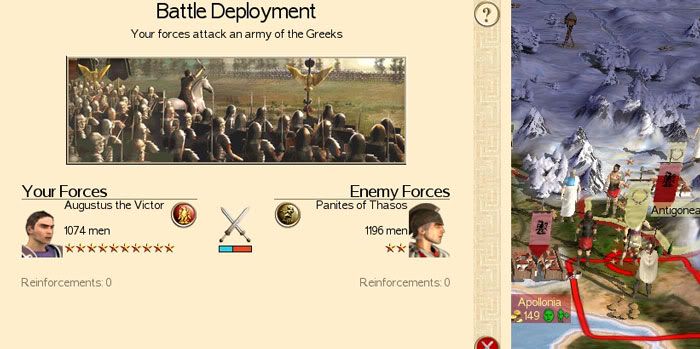
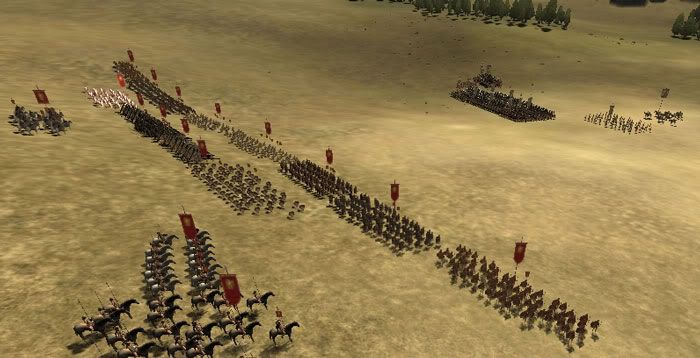
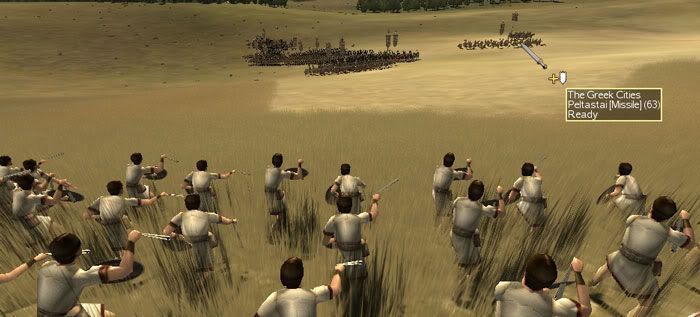
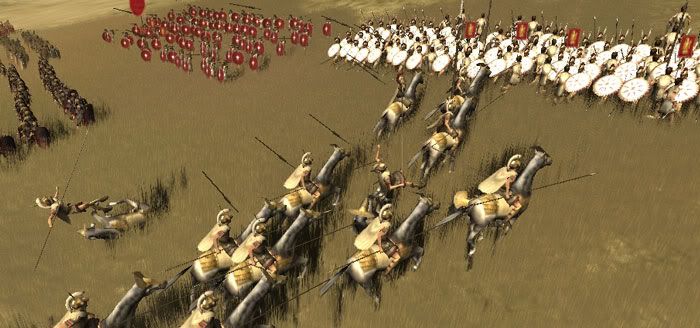
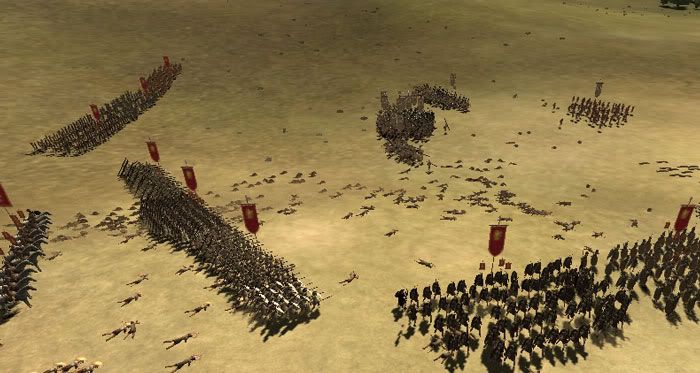
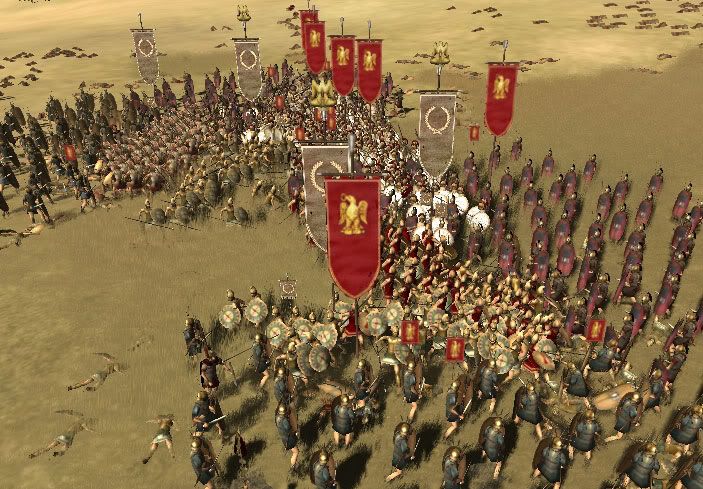
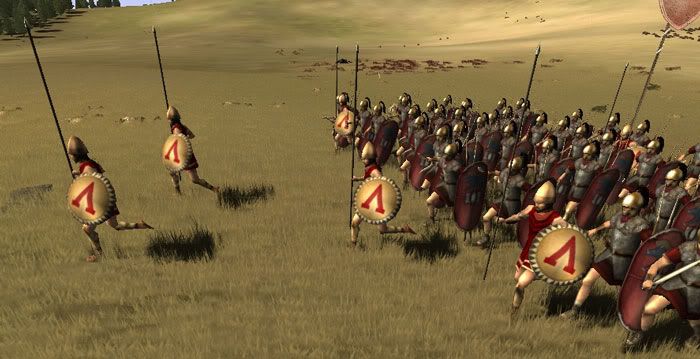
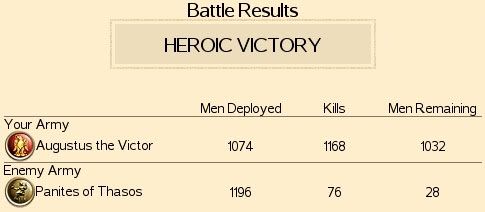
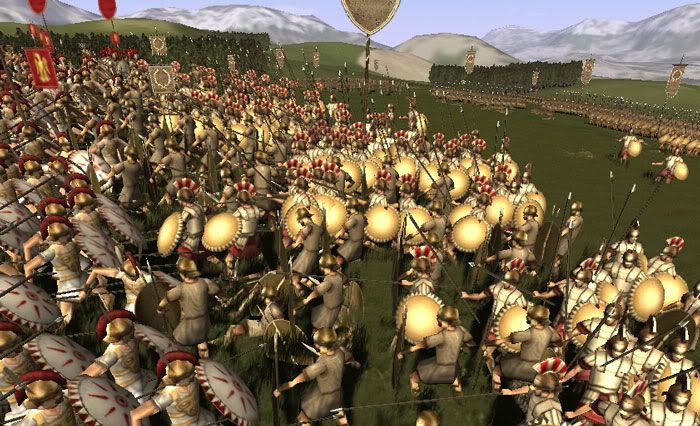
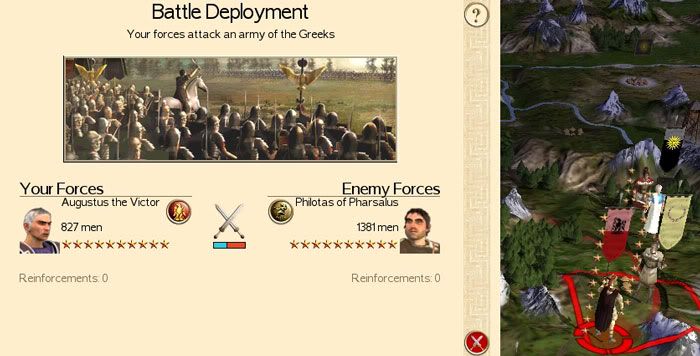
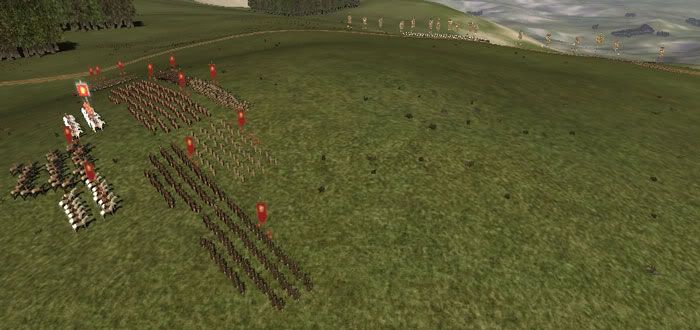
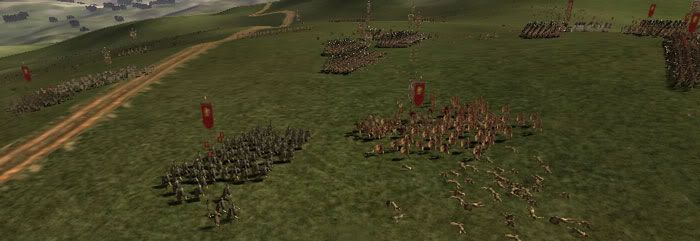
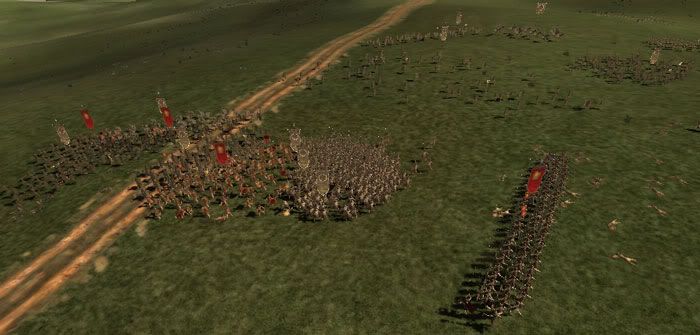
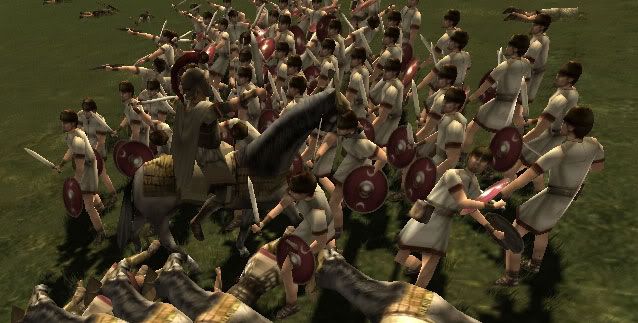
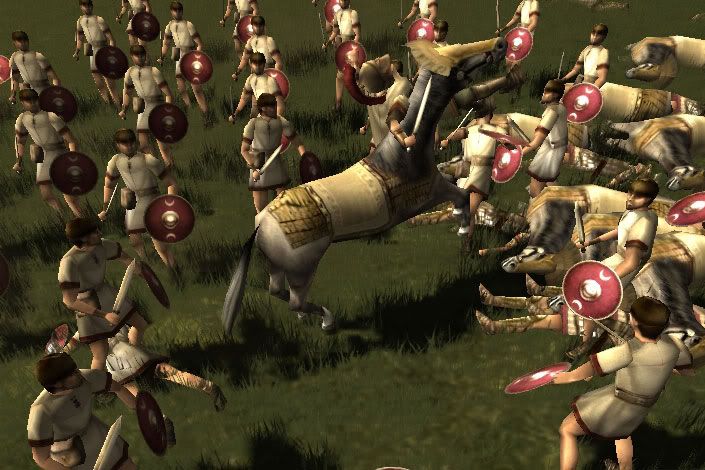
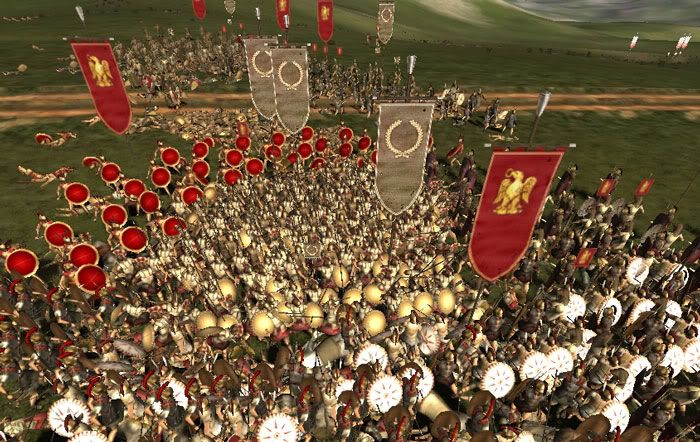
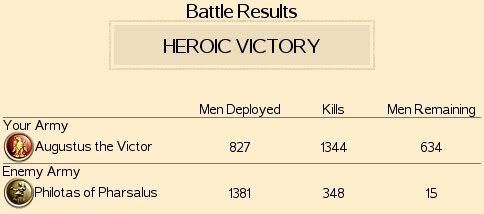
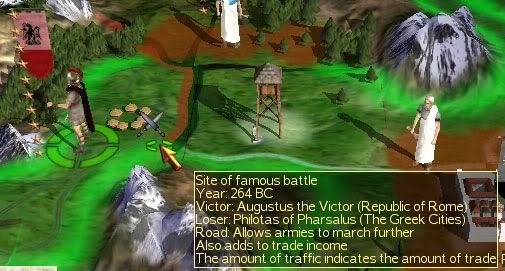
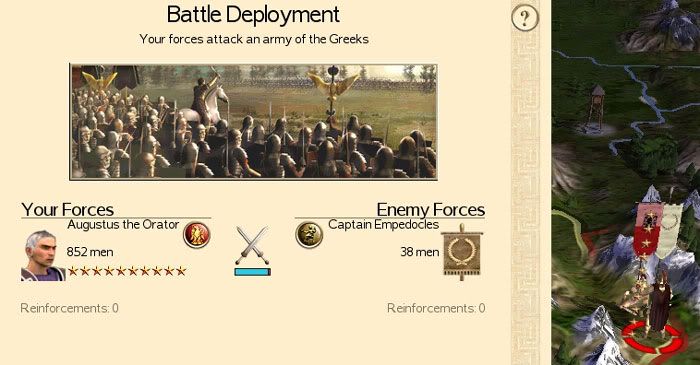
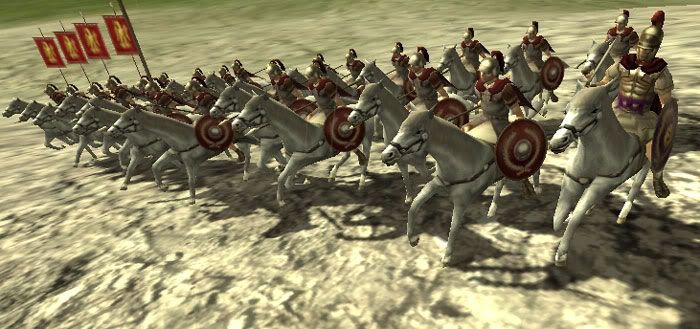
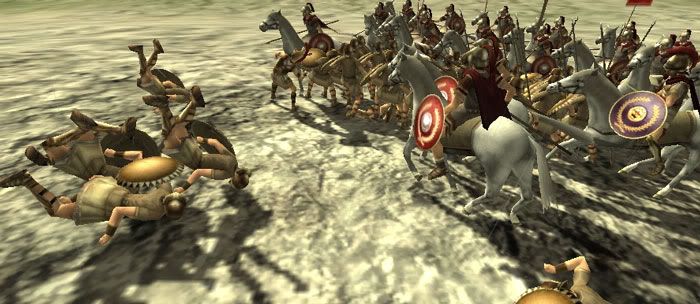
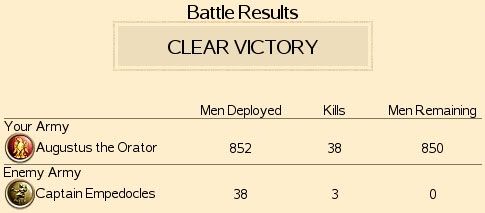





Bookmarks